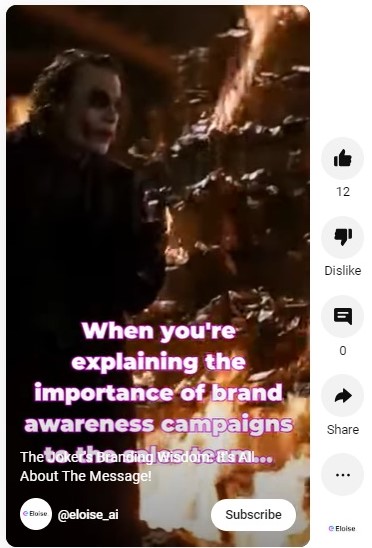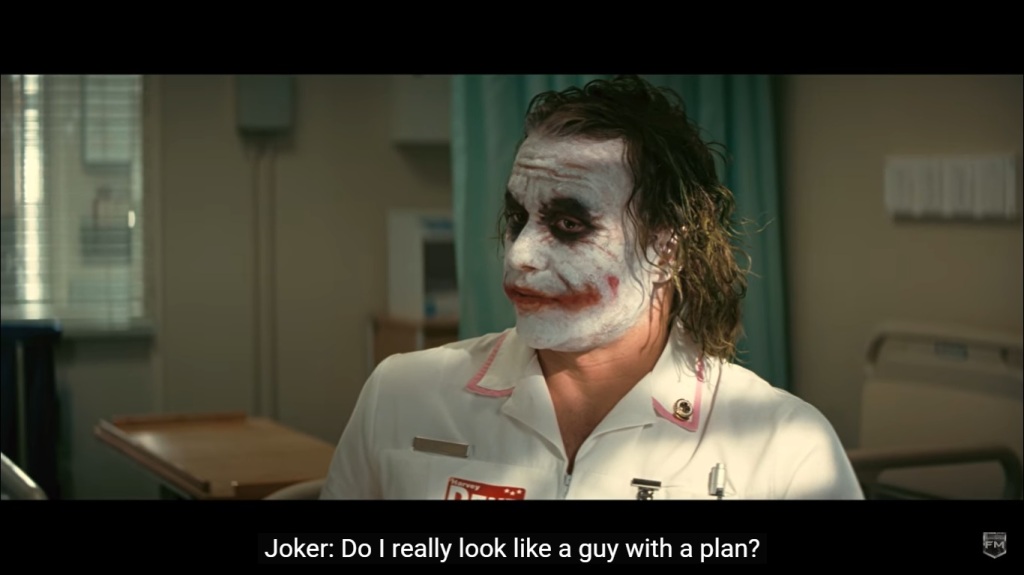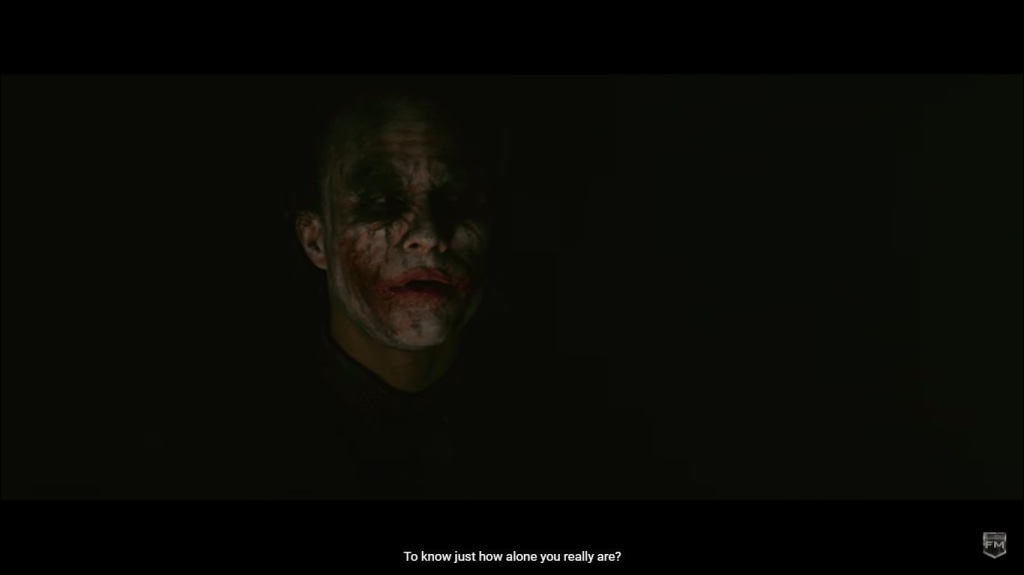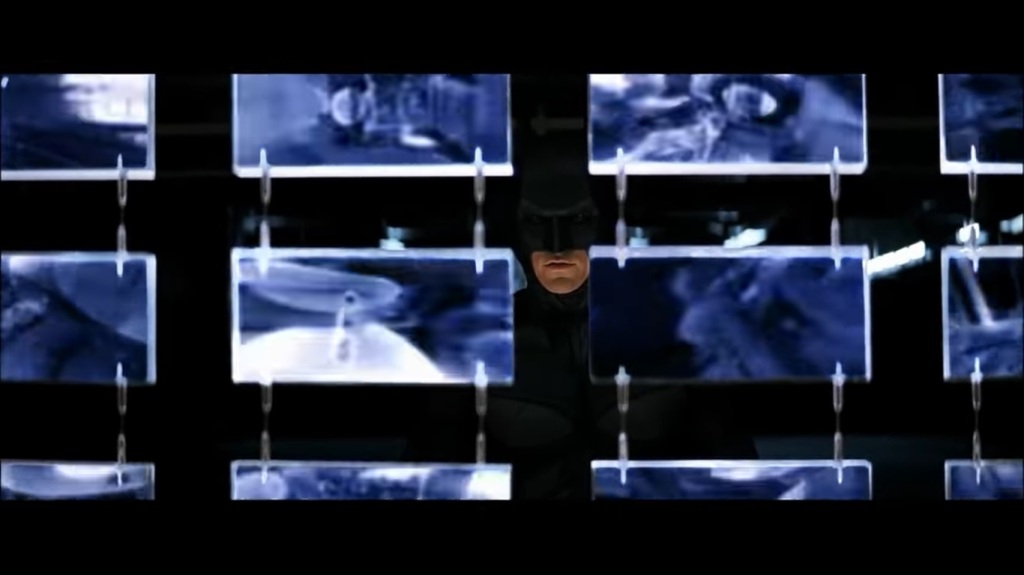Fyodor Dostoevsky’s Demons essentially accomplishes that at which Christopher Nolan’s Dark Night aims but fails miserably. Where Dark Knight inhumanly forces dialogue from philosophy books into the mouths of actual, flesh-and-blood characters, Demons has characters living, enacting, embodying, and discussing philosophical ideas.
There really is no hero in Demons – which is better, or closer to reality. The whole reason it has that title is because you also might not notice the demons otherwise. By contrast, in Dark Knight, it’s just the opposite. The demons are exposed out in the open. And, in Dark Knight, the hero is just as obvious – which feeds into false fantasies. Everyone loves Dark Knight, though. And, without getting into specifics of the film, it’s difficult to connect my words to what I see in the film, to communicate what I mean. So, I went looking for scenes that best reveal my frustration with Batman: The Dark Knight.
Exhibit 1 – linked here – was HUMAN RELATIONSHIPS AND IDEAS
Exhibit 2 – linked here – was PRIVACY RIGHTS VS. THE COMMON GOOD, OR FREEDOM VS. DESPOTISM
Exhibit 3 – linked here – was EXISTENTIAL ALIENATION AND FREEDOM OF SELF-RULE
Exhibit 4 – linked here – was A SCHEME TO DESTROY SCHEMES VS. REALITY REVEALING THEIR FUTILITY
Exhibit 5 – linked here – was FALSE HEROES VS. TRUE HUMANITY
Exhibit 6 – linked here – was DISPLAYING VS. RE-VEALING
Exhibit 7 – HEROES MADE IN THE IMAGE OF IDEAS

“It’s not about money, it’s about sending a message.”
– The Joker
By contrast to what we see in “Dark Knight,” the following is from Demons, by Fyodor Dostoevsky. Here, the action starts with Pyotr Stepanovich speaking. He is the ring leader of the group of radical liberals operating in the province. Kirillov is an associate.
“That’s another turn of affairs. It seems to me you have two different causes mixed up here; and that is highly untrustworthy. But, excuse me, what if you are God? If the lie ended and you realized that the whole lie was because there had been this former God?”
“You’ve finally understood!” Kirillov cried out rapturously. “So it can be understood, if even someone like you understands! You understand now that the whole salvation for everyone is to prove this thought to them all. Who will prove it? I! I don’t understand how, up to now, an atheist could know there is no God and not kill himself at once. To recognize that there is no God, and not to recognize at the same time that you have become God, is an absurdity, otherwise you must necessarily kill yourself. Once you recognize it, you are king, and you will not kill yourself but will live in the chiefest glory. But one, the one who is first, must necessarily kill himself, otherwise who will begin and prove it? It is I who will necessarily kill myself in order to begin and prove it. I am still God against my will, and I am unhappy. because it is my duty to proclaim self-will. Everyone is unhappy, because everyone is afraid to proclaim self-will. That is why man has been so unhappy and poor up to now, because he was afraid to proclaim the chief point of self-will and was self-willed only on the margins, like a schoolboy. I am terribly unhappy, because I am terribly afraid. Fear is man’s curse… But I will proclaim self-will, it is my duty to believe that I do not believe. I will begin, and end, and open the door. And save. Only this one thing will save all men and in the next generation transform them physically; for in the present physical aspect, so far as I have thought, it is in no way possible for man to be without the former God. For three years I have been searching for the attribute of my divinity, and I have found it: the attribute of my divinity is Self-will! That is all, by which I can show in the main point my insubordination and my new fearsome freedom. For it is very fearsome. I kill myself to show my insubordination and my new fearsome freedom.”
His face was unnaturally pale, his look unbearably heavy. He was as if delirious. Pyotr Stepanovich thought he was going to collapse right there.
“Give me the pen!” Kirillov suddenly cried quite unexpectedly, in decided inspiration. “Dictate, I’ll sign everything…”
– from Demons, by Fyodor Dostoevsky, Part Three, A Toilsome Night, pp. 618-9
We watch this scene from “The Dark Knight,” and we think, “Who would ever burn a pile of money like that, just to prove a point?” We read this scene from Devils, and we think, “Who would ever kill themselves like that, just to send a message?” Both actions are narrative exaggerations to make a point. The difference is this. Dark Knight is itself about sending a message. An idea. Demons is about the character. The humanity. That’s why The Joker is an absurdly inhuman villain no one can identify with. And yet, as Joker’s ideal double, Batman is an absurdly inhuman hero for everyone to identify with. By way of contrast to that entire framework of relationships, Kirillov is a human trying to make a point, with whom we can, despite the absurdity of his contemplations, almost identify.
Christopher Nolan over-exaggerates the messages, the ideas themselves, to the point of forcing them out into the open. This renders them both unrecognizable to actual human experience inside the lived limits of the horizon and irrelevant to our use of ideas in speech and thought as we actually try to navigate our real-life environment. I suppose that’s fine, insofar as the world of the film is a universe into itself (though it’s not). The problem is, such exaggeration of ideas themselves to the point of irrelevance means Nolan thus also misses the “demons” who are actually predominantly at work in our context. He presumes to vaguely shatter certain vague fantasies. What he is really doing is upholding and reinforcing distortions to our humanity like individualism, the authority of the police state, mass consumer spectacle, capitalist dependence on base desires, and supposedly universalizing disincarnation. And, of course, it is false heroes who “send the message” of false fantasies.
Dostoevsky’s insistence on staying inside the limits of embodied humanity actually renders him more capable of discerning the realities we face in our daily lives. Nolan’s work, on the other hand, serves simply – and basely – as a spectacle from a distance. And it puffs us up into the transcendent position and place of abstracted, disembodied ideas or “messages.” These “messages” appear in the likeness of the symbolic hero of Nolan’s narrative, who, as Dostoevsky helps us realize, does not actually exist.
Fundamentalist Christians are not the only ones who presume to impose disembodied ideas down onto reality from above. It’s a temptation we all share. And, we all presume to do it from atop some Temple. It’s just that Christopher Nolan is standing atop a slightly different, though practically related and interwoven temple, from the one I grew up in.
“Dostoevsky called the novel Demons, we would suggest, precisely because the demons in it do not appear, and the reader might otherwise overlook them. The demons are visible only in distortions of the human image, the human countenance, and their force is measurable only by the degree of the distortion.”
– Richard Pevear, foreword to Demons (p. xiv)
Christopher Nolan makes humans in the image of disembodied ideas. Fyodor Dostoevsky helps us embody a fuller and truer humanity.








